Career Shifts in 2025: Why Over 60% of Gen Z and Millennials Are Planning a Job Change
2025 is set to be a landmark year for career changes. Two-thirds of Gen Z (66%) and Millennials (65%) are planning to switch jobs, joined by 40% of Gen X and 15% of Boomers. From inflation and job insecurity to shifting priorities, workers across generations are reevaluating their careers. As this tide builds up, understanding what’s driving it—and how to navigate it—is more important than ever.
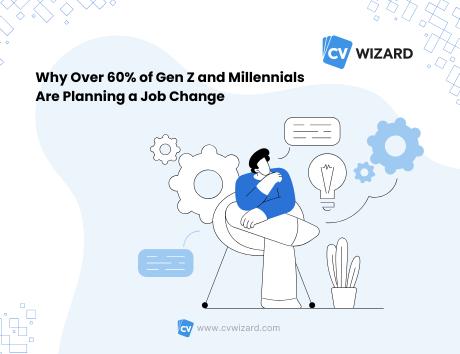
Gen Z is shaping workplace culture and influencing the job market like no other generation before them. As Gen Z employees exert their influence, the job market is becoming more fluid. According to a recent study, 66% of Gen Z and 65% of Millennials are considering changing jobs in the coming year, a shift that could have major consequences for companies, economies and the workforce.
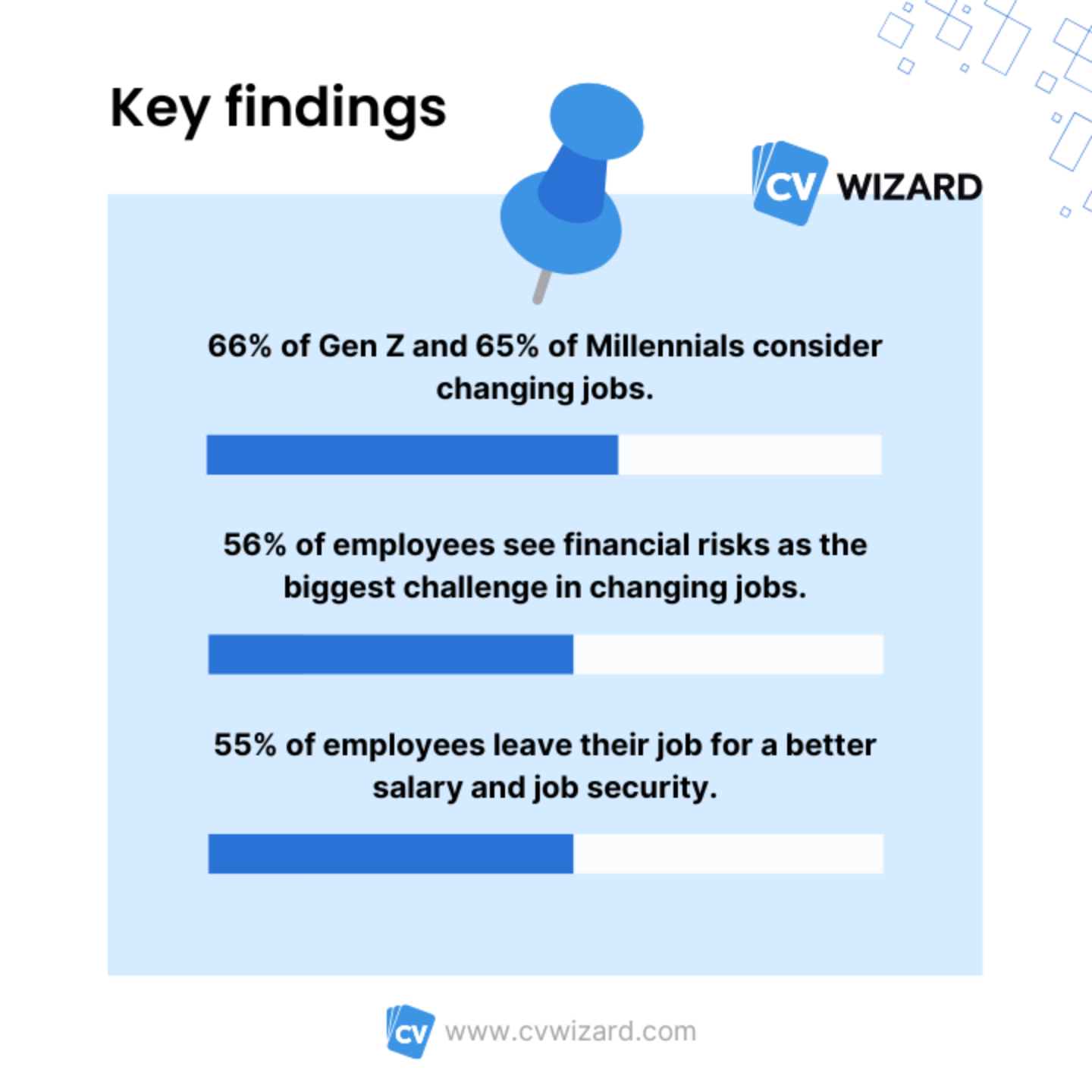 But what are the reasons behind this increasing job market fluidity? Why are so many workers seemingly dissatisfied with the traditional notion of a steady career, and what challenges stand in the way of workers achieving their career goals? In this article, we’ll discuss the underlying reasons behind the shift, evaluate the obstacles jobseekers face and address how both employers and employees can adapt to the new normal.
But what are the reasons behind this increasing job market fluidity? Why are so many workers seemingly dissatisfied with the traditional notion of a steady career, and what challenges stand in the way of workers achieving their career goals? In this article, we’ll discuss the underlying reasons behind the shift, evaluate the obstacles jobseekers face and address how both employers and employees can adapt to the new normal.
Who’s Looking for a Job Change?
With the changes to working life brought on by the pandemic and technological advances, younger workers aren’t the only ones whose expectations are shifting. Attitudes to work and careers look different across the board compared to just a few years ago.
A recent study from CVwizard indicated that more than six in 10 US workers (61%) were hoping or expecting to move jobs in the coming year. Only 21% of workers were confident they wouldn’t be changing roles in the year ahead, while a similar number were undecided (18%). Looking at older generations of workers, 40% of Generation X were contemplating a career change, while Baby Boomers were slightly more secure in their jobs, with just 15% considering a job switch.
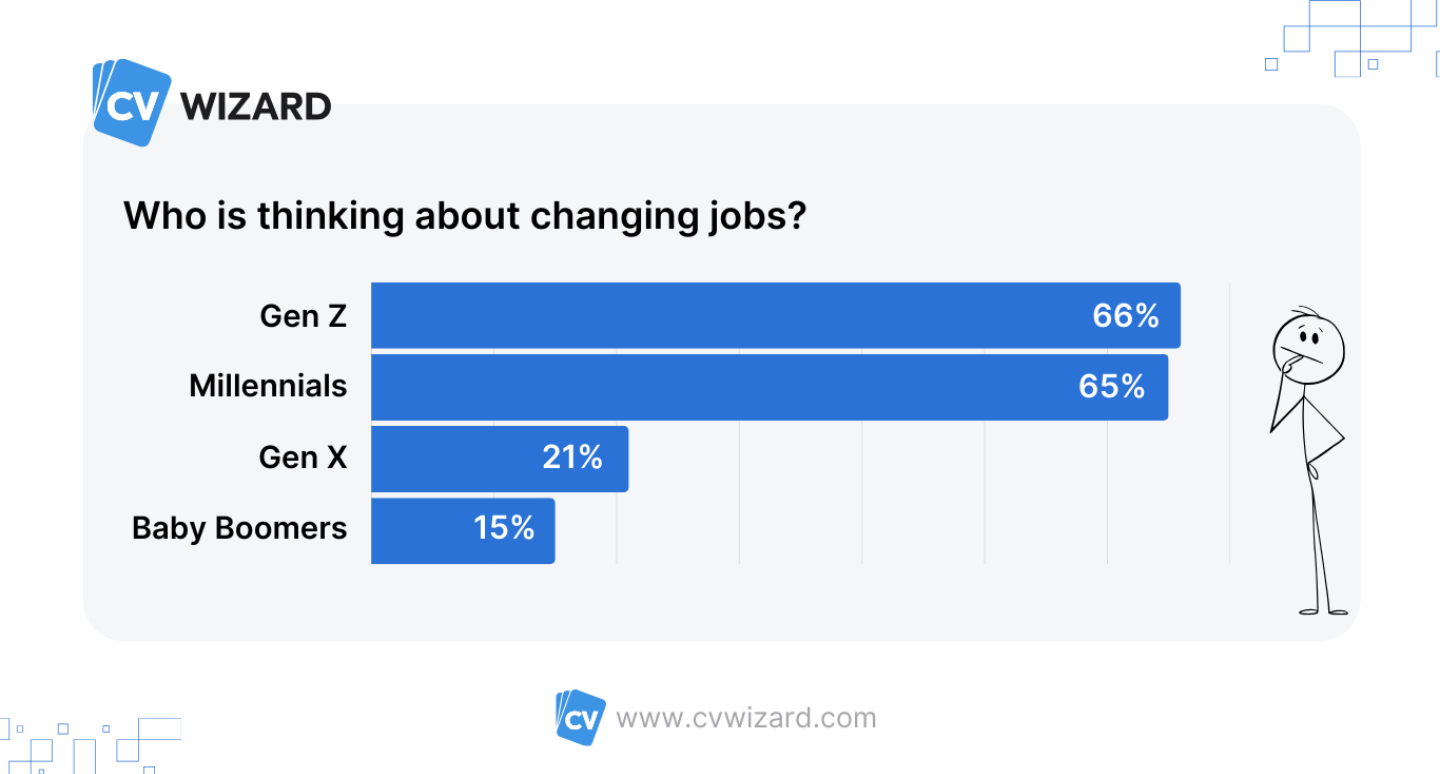
Data shows that Boomers and Gen X typically spend far longer in a job than their younger counterparts. Statistics published by the US Bureau of Labor Statistics show that among workers aged between 60 and 64, 52% had been in their job for more than 10 years (1), compared to just 21% of those aged 35 to 39. This makes the growing proportion of workers of all ages looking to switch jobs appear all the more remarkable.
Interestingly, the CVwizard survey showed that Gen Z is the only age group where women are more likely to switch jobs than men (71% to 63%). In all other age groups, men consistently express more intent to change jobs, with the gap most shown among Millennials (70% to 62%) and Gen X (51% to 40%).
The Top Reasons Workers Are Leaving Their Jobs
Let’s take a look at the reasons employees give for considering a career change. CVwizard’s data indicates the most common motivations behind job changes in 2025 are:
- Better salary (35%): With challenging economic conditions and wages struggling to keep up with inflation, workers are looking to change jobs to secure higher pay.
- Job security (20%): Economic uncertainty and the risk of layoffs have increased concerns among employees about long-term job security.
- Career growth (19%): 1 in 5 employees feel stuck in their current roles and want to seek opportunities to advance their careers.
- Better work environment (18%): Unhealthy workplace cultures and a lack of work-life balance are driving employees to search for more accommodating work environments.
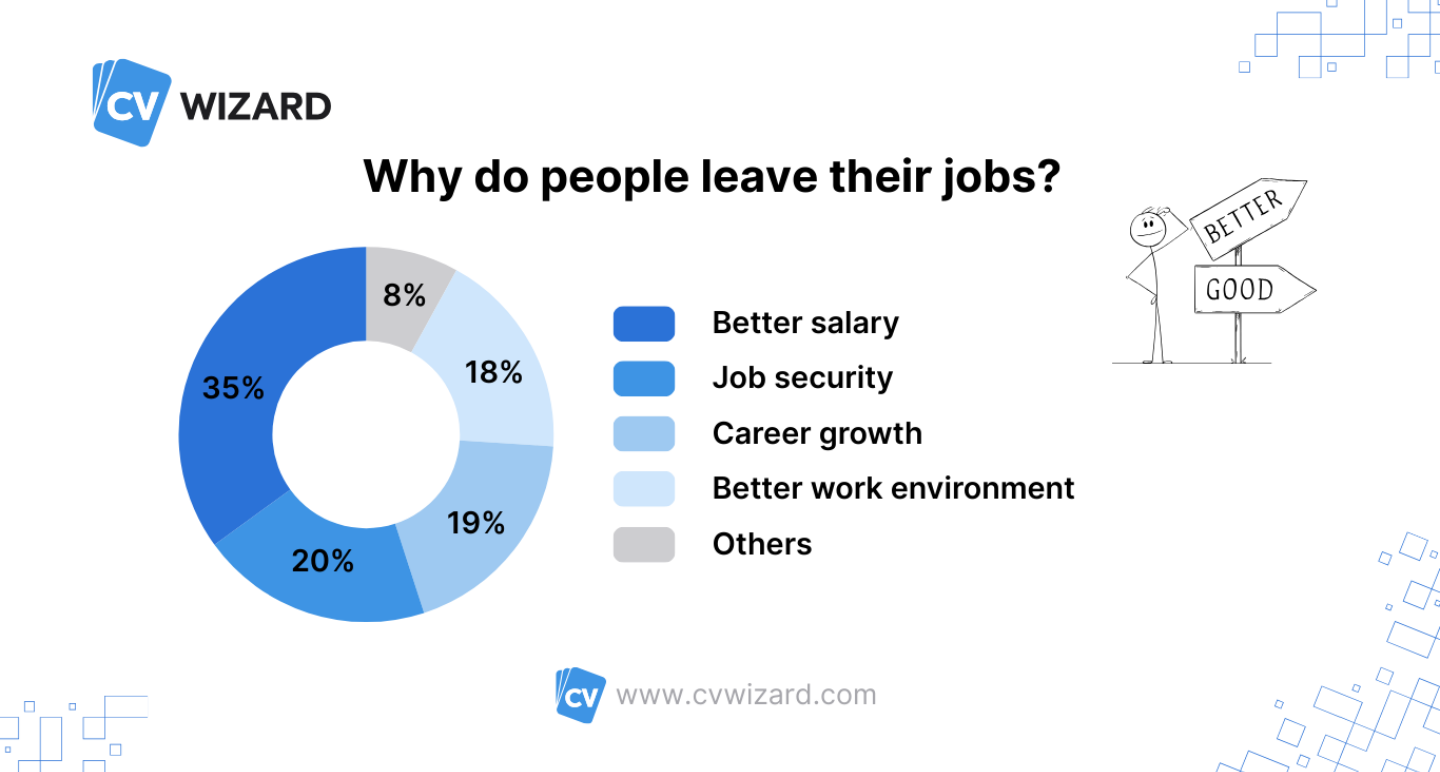
The Biggest Challenges Facing Jobseekers
Even if more workers than ever are considering a change of job, numerous challenges could obstruct their progress. CVwizard asked US employees to name the main reasons holding them back from making that decisive career change in 2025. The most commonly cited reasons were:
- Financial risk (56%): The uncertainty that comes with a new job is too risky for some employees, with more than half concerned with the financial risks associated with changing jobs.
- Lack of experience (51%): Half of jobseekers are concerned that they don’t have the right skills or qualifications to gain a better job.
- Re-skilling and education (47%): Close to 1 in 2 employees feel the need to upskill to achieve career progression, but might not have the time or resources to do so.
- Networking (44%): Almost half of workers feel they lack the networking connections to help them land their next job.
- Finding a job and standing out (40%): With the job application process becoming more and more competitive, crafting a resume that stands out from the crowd is a daunting task for some jobseekers.
- Determining the right career path (31%): Around a third of employees are interested in leaving their current job, but are unsure of what to do next.
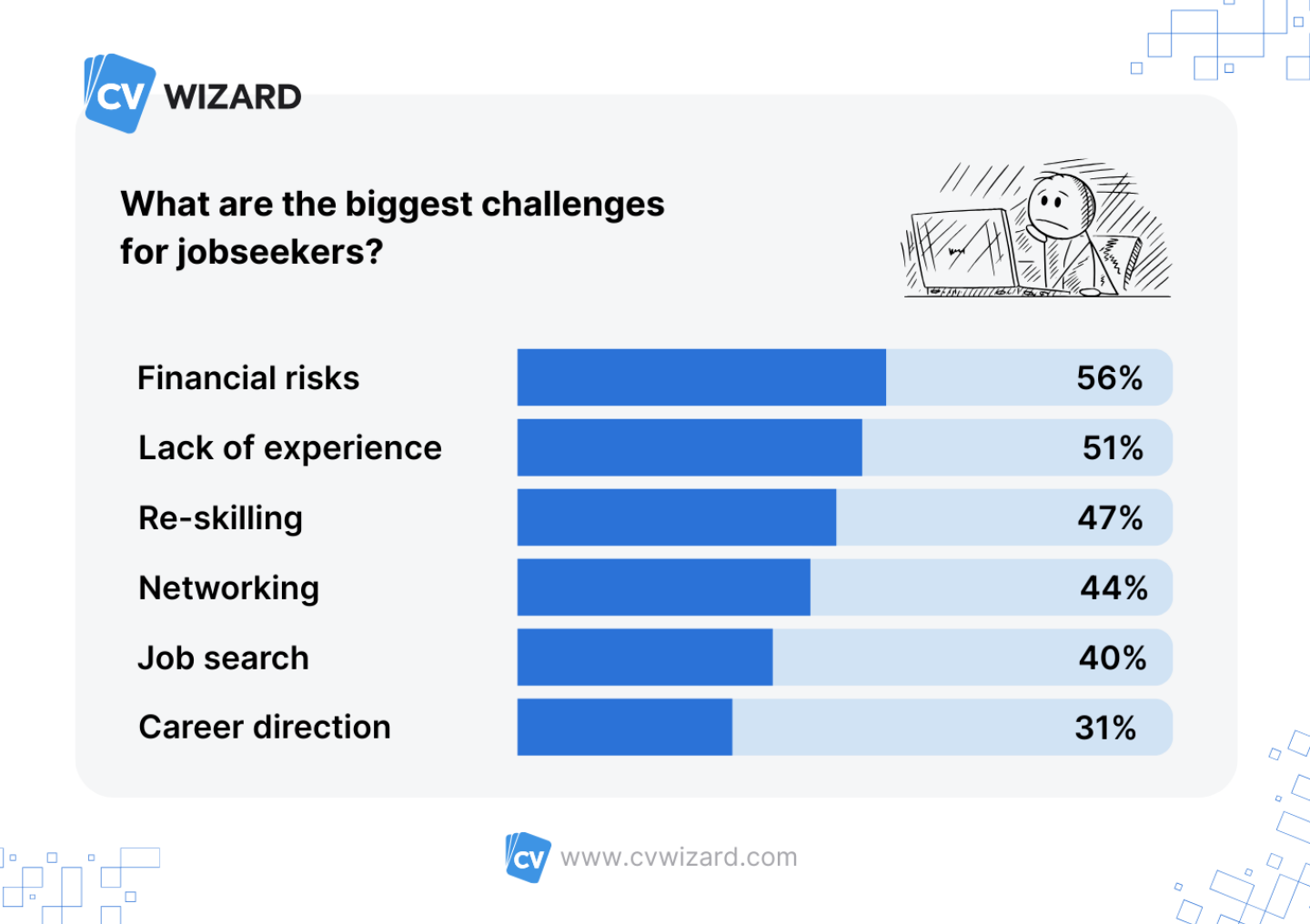
Top career change obstacles per generation
Competing life priorities and different career stages have an impact on the types of obstacles preventing workers from making a major job change. While financial risk is the primary concern of Gen Z, Millennials and Gen X, Boomers are less concerned. This reflects the likelihood of Boomers to be more financially secure.
Conversely, Boomers are more concerned with re-skilling and education, and finding the right career path later in life. For Gen Z, lack of experience and deficits in networking connections are among the main stumbling blocks.
The reasons given for wanting to change jobs differ significantly according to age, reflecting the career journeys and alternative priorities at different life stages of the average worker:
- Gen Z: financial risk, lack of experience, and networking
- Millennials: financial risk, lack of experience, re-skilling and education
- Generation X: Financial risk, re-skilling and education, lack of experience
- Boomers: Re-skilling and education, determining the right path, financial risk
Gen Z appears less concerned about obstacles related to re-skilling, while Boomers are less concerned about the financial risk. Millennials and Gen X share the same key concerns, while all three of Gen Z, Millennials and Gen X are primarily concerned with the financial risk involved in switching jobs.
How Can Jobseekers Overcome Job Change Challenges?
If you’re considering a career change in the year ahead, there are several things you can do to get ahead and overcome the greatest challenges. Follow this step-by-step by guide to prepare yourself for a major career change and give yourself the best chance of success:
1. Manage the financial risk:
- Save up a safety net of between three and six months of living costs before making the move.
- Seek opportunities to bridge the gap between jobs through freelance or temporary work.
- Be bold in your salary negotiations to maximize your earning potential.
2. Develop the right experience:
- Seek opportunities to add experience through personal projects, side hustles, internships or volunteer work.
- Use online training portals to add relevant skills.
- Use AI-assisted resume tools like CVwizard to improve your resume and make your experience count.
3. Grow your network:
- Sign up for industry events, conferences and networking meetings and talk to as many new people as possible.
- Connect with mentors, former colleagues and previous managers (especially via LinkedIn), who may be able to provide job leads.
- Join online communities for your industry to stay in touch with developments.
4. Refine your applications and profiles:
- Tailor your resume and cover letter for every job application.
- Optimize your applications with industry-specific keywords and a professional-looking resume design.
- Use employment and social networking platforms to showcase your industry experience and expertise, sharing insights and engaging with key industry contacts.
What Does the Job Change Trend Mean for Employers?
The shift towards more frequent job switching means major changes for employers as well as employees. Higher staff turnover can affect productivity, harm employee morale and team cohesion and increase recruitment costs. While Gen Z is considered harder to manage by many employers (2), the workforce is set to become more dominated by workers from this generation, with around 30% of workers expected to come from Gen Z by 2030 (3).
Here are just a few ways employers can stay ahead of the job change trend in 2025:
- Conduct stay interviews: Rather than waiting for employees to leave before understanding their reasons, talk to them beforehand, so you can make the necessary changes to encourage them to stay.
- Offer training programs: Give employees the tools they need to progress their careers by offering structured training programs and giving employees time to pursue professional development
- Prioritize employee wellbeing: Consider flexible work arrangements, mental health support and DEI initiatives to create an inclusive workplace that’s focused on helping employees achieve a manageable work-life balance.
Conclusion: The Future of Work Looks Very Different
The job switching trend will continue to shape the world of work in 2025. There’s currently an underlying tension between employees seeking better pay, career growth and a healthier work-life balance and employers looking to row back flexible working policies (4) and scrap DEI initiatives (5). However, as Gen Z’s influence on workplace culture grows, employers may find it difficult to hold back the tide of change. As employee retention becomes ever-more challenging, employers who find ways to adapt will give themselves the best chance to thrive in the new landscape.
Sources:
- Employee Tenure in 2004 (PDF)
- Gen Z Careers The Worst To Manage, 45% Of Hiring Managers Say
- What We Can Expect From Gen Z In The Workforce In 2025
- Companies That Have Ended Fully Remote Work in 2024 and 2023
- IBM Reportedly Walks Back Diversity Policies, Citing ‘Inherent Tensions’: Here Are All The Companies Rolling Back DEI Programs
Research & Analysis by: Reyhane Mansouri, PhD
Written by: Mike Potter, CPRW
Make an impression with your resume
Create and download a professional resume quickly and easily



